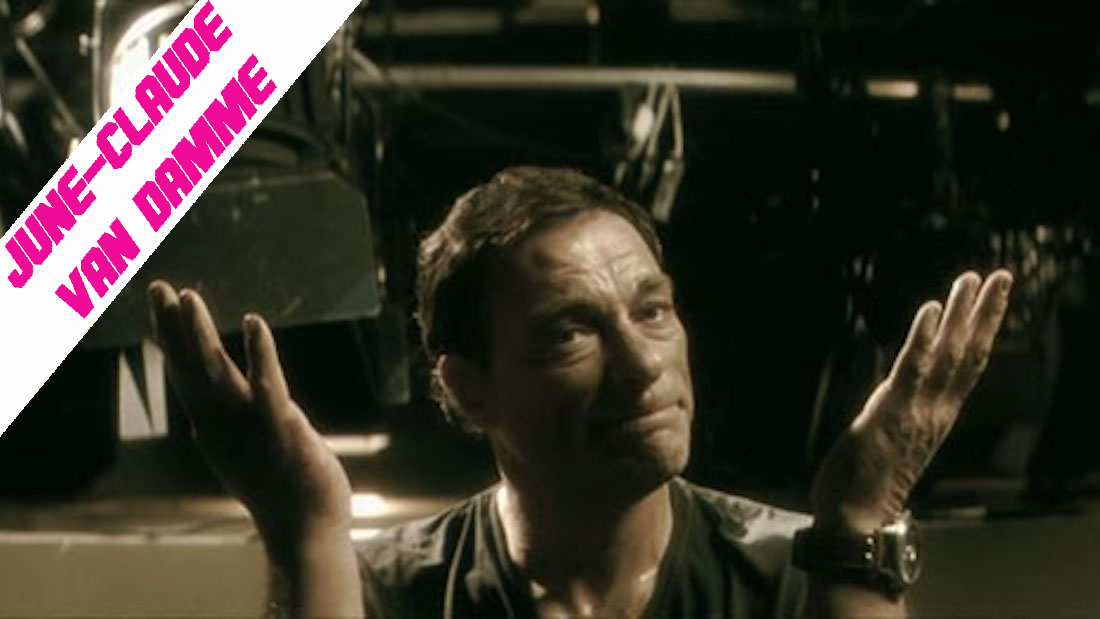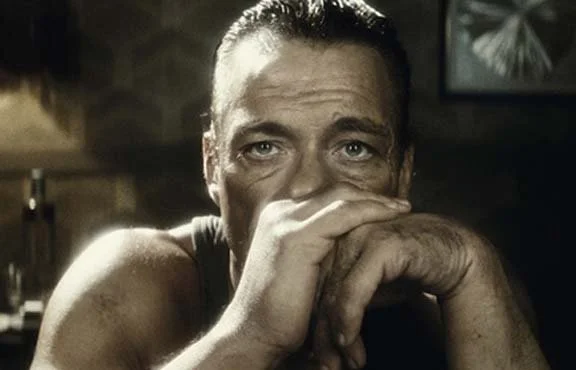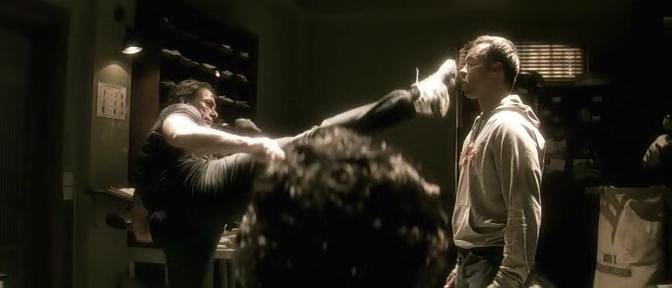JCVD (2008)
In which the world discovers Jean-Claude Van Damme can act as well as he can kick…
For all of his success in the 1990s, martial arts star Jean-Claude Van Damme was often hit with the same criticism as his action peers: yeah, he kicks well but he can’t act. While some people, including yours truly, were banging the drum for years that Van Damme was a far better actor than his contemporaries like Arnold Schwarzenegger and Steven Seagal, in 2008 Van Damme starred in a film that silenced even his most ardent critics; JCVD from director Mabrouk el Mechri.
Van Damme had tried to flex some dramatic muscles during his heyday, whether it was as the sensitive drifter who kicks people in NOWHERE TO RUN (1993), the amnesiac supersoldier who kicks people in UNIVERSAL SOLDIER (1992), or the brooding widower who kicks people in TIMECOP (1994), but it always felt like he had to do that work in the margins of his films. The kicking of people always had to come first, and unfortunately much of his dramatic advancement came to a halt when his well-documented personal problems began to derail his career.
Whether due to those personal problems, or just the shifting tastes of a fickle moviegoing public, Van Damme’s career as a box office star fizzled in the late ‘90s. He found himself, like so many of his contemporaries, relegated to the direct-to-video (DTV) market, at least in the United States (Van Damme has always been a big draw in other countries). But having this smaller profile allowed Van Damme the freedom to work on his acting craft. Beginning with 2001’s Ringo Lam-helmed REPLICANT, Van Damme began taking on varied projects that pushed him as an actor, movies that wouldn’t have been possible with his earlier high profile since the plots often involved Van Damme going dark. Whether it’s the brutal prison drama IN HELL (2003), or the merciless revenge thriller WAKE OF DEATH (2004), Van Damme showed he was unafraid to both go to dark places and show a vulnerability that he never could have when he was starring in DOUBLE IMPACT (1991). Of particular note during this era is 2006’s UNTIL DEATH, which sees Van Damme playing a monstrous person who must relearn how to live after being rendered brain-damaged in an attempt on his life. Van Damme really capitalizes on his sensitive darkness in the film, and it’s a bit of revelation for Van Damme: The Actor. But not even REPLICANT or UNTIL DEATH prepared people for what happened when French director el Mechri came calling.
JCVD goes full metatextual from the first scene. After a stunning single-take action scene, we find out the film stars Van Damme as himself, and the single take scene is him merely filming a movie. It’s a low budget affair, typical of his recent DTV work, and Van Damme is frustrated with his lot in life. He’s broke, his ex-wife wants custody of their daughter, and he can’t even work with competent directors, a far cry from his days as the “the man who brought John Woo to America.”
The film kicks in properly when Van Damme returns to his home of Brussels to clear his head and stay in the one place his fans still consider him an icon. Unfortunately, Van Damme finds himself in a predicament when he visits a post office/bank just as it’s being robbed. Everyone, including Van Damme, is taken hostage, and Van Damme finds himself having to rely on his reputation to help diffuse the situation. Unfortunately, ACTION GOD Jean-Claude Van Damme, doesn’t exist, and all the hostages have is broken down, sad bastard actor Van Damme.
Creating an overtly meta film like JCVD is a tricky proposition. If the balance isn’t struck properly the films can either end up overly and irritatingly hipster, as in Charlie Kaufmann’s ADAPTATION (2002), or descend into cloying fan wankery, like 2022’s THE UNBEARABLE WEIGHT OF MASSIVE TALENT (I promise I didn’t mean to single out two Nicolas Cage movies, but they are prime examples. I still love you, Nic!). Luckily, JCVD director El Mechri nails the balance as well as anyone has. [Editor’s Note: Cage is a big fan of JCVD.]
The film has the prerequisite nods to Van Damme’s previous films, including a heartbreaking scene featuring his ex-wife’s lawyer using his films against him in a custody hearing. It also has the necessary commentary on filmmaking and the price of fame. El Mechri goes for a grainy look, with plenty of oversaturation, creating a cinéma vérité vibe. El Mechri was a fan of Jean-Luc Goddard’s French New Wave stylings, and it shows throughout JCVD. But the director wasn’t just a Goddard fan. He was a lifelong fan of Van Damme and wanted to do right by him. JCVD originally began as much more of a meta comedy, in which Van Damme comes across as a buffoon, but el Mechri rightfully believed Van Damme had more to give dramatically. He believed that he could pull a great performance out of Van Damme. So el Mechri reworked the script into a somber, melancholy meditation on loss and wasted dreams. While the film still features plenty of humor, there’s a pervasive sadness to the whole affair.
El Mechri’s ideas were great and his direction was skillful, but nothing in the film works without the central star buying in completely. Luckily Van Damme loved the idea and gave the performance of his career. His heartbreakingly vulnerable performance lays bare for the world the scars of a life of success, excess, failure, and redemption. Everything Van Damme had been working toward since REPLICANT came to its apex in JCVD. Gone was the cocksure star who partied on red carpets, replaced by a broken shell trying to put the pieces of his life back together. Few meta movies have a star that is this committed to laying everything out there for the world to see. Good, bad, and ugly, Van Damme lets us see it all.
The pinnacle of the film is a six-minute soliloquy in which Van Damme appears to float above the chaos below him, ruminating on his career, his addiction, and his family. The actor never winks at the audience, never breaks his focus on the viewer, and never falters in his complete dedication to being truthful, open, and honest. Even if nothing else in the film worked, this soliloquy would still cement JCVD as one of the best films of the 2000s and a peak of Van Damme’s career, with hardly a kick to be seen.
I realize I am making this movie sound like a dour slog—it’s anything but! It moves at a brisk pace, the supporting actors are uniformly excellent, and there’s plenty of humor to keep things light. And el Mechri’s fandom is apparent. While the movie is focused on laying Van Damme’s foibles out for the world to see, it never loses sight of one important aspect of its star’s life: he’s still Jean-Claude fucking Van Damme. Our action icon still prevails, he regains his dignity, and he marches on. When Jean-Claude Van Damme sees tragedy, he kicks it right in the face.
And march and kick on Van Damme did. The success of JCVD allowed him to steer into more character driven action pieces, including his scene-stealing villainous turns in EXPENDABLES 2 (2012) and ENEMIES CLOSER (2013), a soulful performance as a mute veteran in WE DIE YOUNG (2019), and his career best work (aside from JCVD) in John Hyams’ masterful UNIVERSAL SOLDIER: REGENERATION (2009) and UNIVERSAL SOLDIER: DAY OF RECKONING (2012), which sees him passing the torch to burgeoning action icon Scott Adkins.
If you’ve slept on the late career of Van Damme, you have missed some excellent films and some excellent performances. And there is no better place to start than JCVD. Van Damme can kick, but he can also feel, cry, and bring us on a journey with him. But most of all, he continually reminds us that through career ups and downs, personal difficulties and tragedies, good movies and bad, he remains one thing above all else: Jean-Claude Van Damme. May he live forever.





